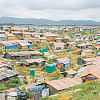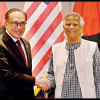Joint Working Group meets in Naypyitaw
The Joint Working Group, responsible for overseeing the repatriation of the Rohingya refugees from Bangladesh, meets in Naypyitaw today amid doubts over safe return and resettlement of the Rohingyas in Rakhine.
A 14-member delegation of Bangladesh, led by Foreign Secretary Shahidul Haque, will meet the Myanmar team led by Permanent Secretary at Myanmar foreign ministry Myint Thu.
Bangladesh and Myanmar are likely to finalise an agreement on the “physical arrangement” to begin the repatriation.
There are 30 officials in the JWG, 15 from each country. This is the first meeting of the JWG since its formation on December 19.
The group was formed following a deal signed between the two countries on November 23, amid global outcry over ethnic cleansing by Myanmar security forces that drove over 660,000 Rohingyas from Rakhine since August 25 last year. The Rohingyas are denied citizenship and basic rights, including education and health, in Myanmar.
"We are expecting an effective meeting [in Naypyitaw] that will smoothen the voluntary and safe repatriation of the Rohingyas," State Minister for Foreign Affairs Mohammed Shahriar Alam told The Daily Star yesterday.
As per the agreement, the repatriation is supposed to begin on January 23. "The repatriation would definitely begin in due time. It may be January 23 or 25. Delay of a day or two does not matter," he said.
Bangladesh has already registered 952,000 Rohingyas, including the ones who fled violence in Rakhine years before.
About reports that the Bangladesh delegation would hand over a list of 1 lakh Rohingyas, Shahriar Alam said nothing of this sort was mentioned in the agreement.
"The number can vary ... it's a continuous process. We will do everything required for the safe and quick return of the Rohingyas," he noted.
UN Refugee Agency would also be involved in the repatriation process if the two countries complied to what they have agreed on in the deal, he said.
As per the November 23 deal, Myanmar will verify the residency documents of the Rohingyas with its own database.
The refugees without documents would be asked to identify streets, villages and other landmarks near their Myanmar homes as proof of their right to return, Shahriar Alam said.
SCEPTICISM
Reuters reports: UN agencies working in the camps in Cox's Bazar have voiced scepticism about the resettlement plans.
The UN High Commissioner for Refugees and the International Organisation for Migration said their offers to help with the process have not been taken up by the two countries.
"Further measures are needed to ensure safe, voluntary and sustainable repatriation of refugees to their places of origin and to address the underlying root causes of the crisis," said Caroline Gluck, a spokeswoman for the UNHCR in Cox's Bazar.
The UNHCR said the refugees it had surveyed wanted guarantees that international agencies would be involved in overseeing the process and more information about the security situation in their home areas.
While many Rohingyas said they want to go back to Myanmar, most of the more than a dozen who spoke to Reuters said they were scared to do so now.
"I am not going back. No one's going back," said Hafizulla, a 37-year-old Rohingya man. "We are scared to go back without any UN intervention. They can accuse us later, they can arrest us. They may accuse us of helping the militants."
The military offensive for which the refugees fled was prompted by Rohingya insurgent attacks on police and army posts.
The UN described the offensive as ethnic cleansing and Myanmar claimed that its troops did not target civilians.
"You can have all the agreements in the world, and set up all the reception centres and everything, but it won't make a difference unless the conditions in Myanmar are such that people feel confident that they can go back and live in peace, and have equal rights," said a Western diplomat in Dhaka.
Refugee Relief and Rehabilitation Commissioner Mohammed Abul Kalam, said the "Rohingyas' reluctance to go back" was an issue that needed to be addressed.
He said the repatriation process would cost "millions of dollars" but funding details had not yet been agreed and were not expected to be discussed at today's meeting.
Meanwhile, Japanese's Foreign Minister Taro Kono on Friday urged Myanmar's civilian leader Aung San Suu Kyi to guarantee the safe and voluntary return of the Rohingyas.
While Taro Kono was visiting Myanmar, the Japanese government announced a grant of $3 million to Myanmar's government to help facilitate the repatriation of the Rohingyas, reports AP.
"We've decided to provide the aid in response to the agreement between Myanmar and Bangladesh to represent an international message of support so that the repatriation can be carried out promptly," said Japan Foreign Ministry official Shinobu Yamaguchi in a statement.
"The money will be paid in a timely manner based on the progress of repatriation," he added.
Kono's three-day visit to Myanmar includes travelling to Rakhine state. Humanitarian groups and independent media are prohibited from travelling to the area freely.
During the meeting on Friday, Kono asked Suu Kyi's government to allow humanitarian and media access to the affected area, the resettlement of returned refugees, and the implementation of recommendations made by former UN Secretary-General Kofi Annan.

 For all latest news, follow The Daily Star's Google News channel.
For all latest news, follow The Daily Star's Google News channel. 








Comments